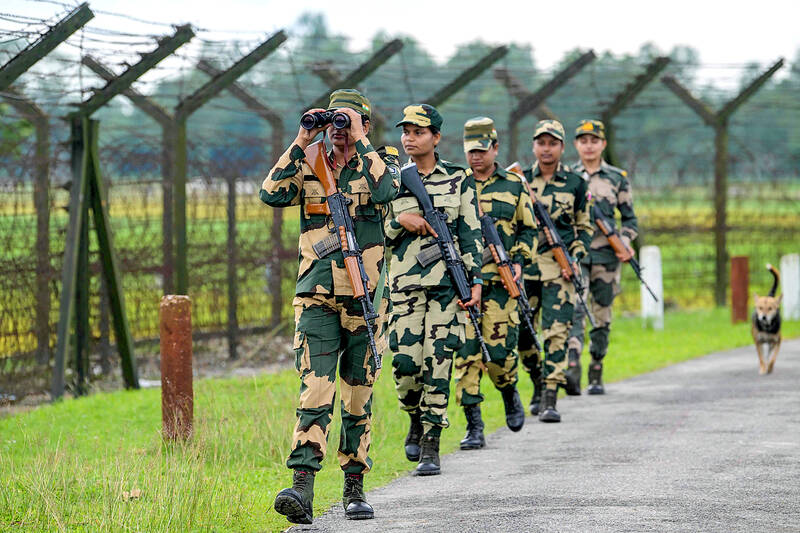India has deported without trial to Bangladesh hundreds of people, officials from both sides said, drawing condemnation from activists and lawyers who call the recent expulsions illegal and based on ethnic profiling.
New Delhi said the people deported are undocumented migrants.
The government of Indian Prime Minister Narendra Modi has long taken a hardline stance on immigration — particularly those from neighboring Muslim-majority Bangladesh — with top officials referring to them as “termites” and “infiltrators.”

Photo: AFP
It has also sparked fear among India’s estimated 200 million Muslims, especially among speakers of Bengali, a widely spoken language in eastern India and Bangladesh.
“Muslims, particularly from the eastern part of the country, are terrified,” Indian rights activist Harsh Mander said. “You have thrown millions into this existential fear.”
India also ramped up operations against migrants after a wider security crackdown in the wake of an attack in the west — the April 22 killing of 26 people, mainly Hindu tourists, in Kashmir.
India blamed that attack on Pakistan, claims Islamabad rejected, with arguments culminating in a four-day conflict that left more than 70 dead.
Indian authorities launched an unprecedented countrywide security drive that has seen many thousands detained — and many of them eventually pushed across the border to Bangladesh at gunpoint.
Rahima Begum, from India’s eastern Assam state, said police detained her for several days in late May before taking her to the Bangladesh frontier.
“I have lived all my life here — my parents, my grandparents, they are all from here,” she said. “I do not know why they would do this to me.”
Indian police took Begum, along with five other people, all Muslims, and forced them into swampland in the dark.
“They showed us a village in the distance and told us to crawl there,” she said. “They said: ‘Do not dare to stand and walk, or we will shoot you.’”
Bangladeshi locals who found the group then handed them to border police who “thrashed” them and ordered they return to India, Begum said.
“As we approached the border, there was firing from the other side,” she said. “We thought: ‘This is the end. We are all going to die.’”
She survived, and was dropped back home in Assam with a warning to keep quiet.
Rights activists and lawyers criticized India’s drive as “lawless.”
“You cannot deport people unless there is a country to accept them,” civil rights lawyer Sanjay Hegde said, adding that Indian law does not allow for people to be deported without due process.
Bangladesh has said India has pushed more than 1,600 people across its border since May, while Indian media suggested the number could be as high as 2,500.

FORUM: The Solomon Islands’ move to bar Taiwan, the US and others from the Pacific Islands Forum has sparked criticism that Beijing’s influence was behind the decision Tuvaluan Prime Minister Feletei Teo said his country might pull out of the region’s top political meeting next month, after host nation Solomon Islands moved to block all external partners — including China, the US and Taiwan — from attending. The Pacific Islands Forum (PIF) leaders’ meeting is to be held in Honiara in September. On Thursday last week, Solomon Islands Prime Minister Jeremiah Manele told parliament that no dialogue partners would be invited to the annual gathering. Countries outside the Pacific, known as “dialogue partners,” have attended the forum since 1989, to work with Pacific leaders and contribute to discussions around

END OF AN ERA: The vote brings the curtain down on 20 years of socialist rule, which began in 2005 when Evo Morales, an indigenous coca farmer, was elected president A center-right senator and a right-wing former president are to advance to a run-off for Bolivia’s presidency after the first round of elections on Sunday, marking the end of two decades of leftist rule, preliminary official results showed. Bolivian Senator Rodrigo Paz was the surprise front-runner, with 32.15 percent of the vote cast in an election dominated by a deep economic crisis, results published by the electoral commission showed. He was followed by former Bolivian president Jorge “Tuto” Quiroga in second with 26.87 percent, according to results based on 92 percent of votes cast. Millionaire businessman Samuel Doria Medina, who had been tipped

Outside Havana, a combine belonging to a private Vietnamese company is harvesting rice, directly farming Cuban land — in a first — to help address acute food shortages in the country. The Cuban government has granted Agri VAM, a subsidiary of Vietnam’s Fujinuco Group, 1,000 hectares of arable land in Los Palacios, 118km west of the capital. Vietnam has advised Cuba on rice cultivation in the past, but this is the first time a private firm has done the farming itself. The government approved the move after a 52 percent plunge in overall agricultural production between 2018 and 2023, according to data

ELECTION DISTRACTION? When attention shifted away from the fight against the militants to politics, losses and setbacks in the battlefield increased, an analyst said Recent clashes in Somalia’s semi-autonomous Jubaland region are alarming experts, exposing cracks in the country’s federal system and creating an opening for militant group al-Shabaab to gain ground. Following years of conflict, Somalia is a loose federation of five semi-autonomous member states — Puntland, Jubaland, Galmudug, Hirshabelle and South West — that maintain often fractious relations with the central government in the capital, Mogadishu. However, ahead of elections next year, Somalia has sought to assert control over its member states, which security analysts said has created gaps for al-Shabaab infiltration. Last week, two Somalian soldiers were killed in clashes between pro-government forces and